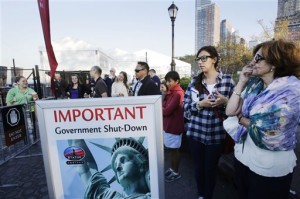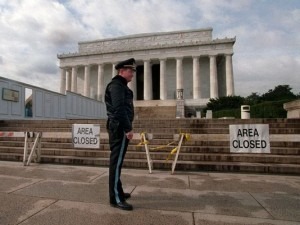HeadCount's Washington D.C. team leader is a federal government employee currently on furlough. This is the first installment in what we hope will be a very short series. The opinions expressed are his own. Shutdown. Essential versus nonessential. Individual mandate. All of these words and phrases are flying around, and few Americans outside of D.C. have a clue what they mean. I actually work for the government and had to look up what we were arguing about and why I may not be getting a paycheck for awhile.
I was under the impression that a simple accounting exercise should not create such an embittered stalemate. As it turns out, though, some members of the House have decided that rather than simply fund my agency and those that employ the other 800,000 federal civil servants who show up to work every day and do our best to get things done despite a lack of progress up on the Hill, a few of them are trying to reenact a battle that was already fought. Rather than approve a straightforward budget, some folks are trying to add on amendments that would defund the new healthcare laws that have been in action for under 24 hours at this point.
Mind you, we have not had an actual budget for quite some time. “Continuing resolutions” (CR) seem to be the way to go these days. These are basically band-aids that allow the government to function for a bit until it is time to stick a new one on. Every six months or so, my boss has called us in and said a potential shutdown is on the horizon unless Congress passes a new CR or, less likely, an actual budget. My colleagues and I were pretty immune up to this point as something always seems to happen at the last minute. However, it would appear that health insurance is the straw that broke the camel’s back. I will admit that I am biased on the issue of health insurance. I lost my dad a few years ago, and my mom, too young to go on Medicare, has had to pay exorbitant premiums to stay insured. The Affordable Care Act (ACA) is a good thing for my family as it will help her actually afford food and clothing in addition to healthcare. Not everyone sees it this way, though. Health insurance is now one of those hot-button topics you should not discuss in mixed company, along with religion and politics.
I remember the days (were they last week?) when political debates revolved around issues of human rights such as marriage equality or abortion. If you throw religion into the mix, I can see how those topics can get dicey. However, I have never heard of a religion that expressly forbids people getting affordable medical coverage. It seems to be a no brainer, but not everyone thinks so. Just last week, Ted Cruz (R-Texas) made a 21 hour speech against the ACA (aka “ObamaCare”). “All across this country Americans are suffering because of ObamaCare. ObamaCare isn't working. Yet fundamentally there are politicians in this body who are not listening to the people. They are not listening to the concerns of their constituents, they are not listening to the jobs lost or the people forced into part-time work, to the people losing their health insurance, to the people who are struggling.” The interesting part of this speech is that the key piece of the ACA — the Health Insurance Marketplace — went into effect TODAY! How were we suffering last week? And seriously, the only problem I have heard about today was that some of the online enrollment exchanges are being overwhelmed and crashing. The same thing happened to Ticketmaster in the UK when Beyonce tickets went on sale last year, but their nation survived!

Another aspect of the ACA is that small businesses will now have to insure their staff. This is also a bad thing for some folks. According to the Heritage Foundation, “The employer mandate will change the nature of the employer–employee relationship, as employers will want detailed household information, such as family size and income for each family member, from each of their employees. The economic effects of the employer mandate will likely be lower profits for many businesses, lower wages for millions of workers, increased unemployment, and higher prices for many goods and services.” Or, perhaps, it will mean healthier workers, decreased leave due to illness, and greater quality of work life. Just saying….
So really, what does any of this mean? For my friends and me, it means, as “non-essential” or the more PC, “non-excepted” employees, we are off work indefinitely and we will not get paid. D.C. will be kind of a ghost town during the day since all the museums and parks are closed and everyone will continue to go out at night and commiserate. Parts of the government that actually affect those outside D.C., such as the FAA, will remain in operation. Meanwhile, the elected officials up on the Hill will continue to argue and collect a paycheck, because their salaries have been written into law. Perhaps we should be attacking that law rather than one that has the potential to benefit 300 million people.
